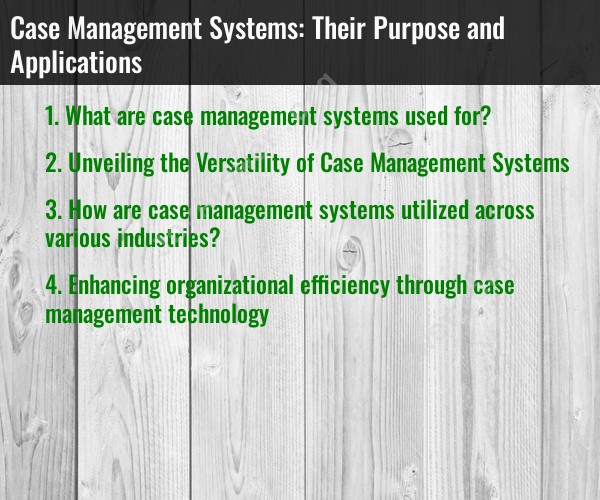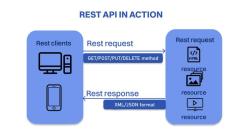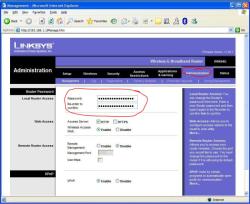What are case management systems used for?
Case management systems are software applications designed to streamline and enhance the process of managing and coordinating cases or projects. These systems are used across various industries and sectors to facilitate the efficient handling of tasks, data, and communication related to specific cases. Here are some common purposes and applications of case management systems:
Client/Customer Relationship Management:
- Case management systems are often used in customer relationship management (CRM) to keep track of interactions, communications, and important details related to clients or customers. This helps organizations provide better service and maintain organized records.
Healthcare Case Management:
- In healthcare, case management systems are utilized to coordinate patient care, manage medical records, and track treatment plans. These systems enhance communication among healthcare professionals and ensure that patients receive comprehensive and well-coordinated care.
Social Services:
- Social service agencies use case management systems to support individuals and families in need. These systems help track client information, assess needs, and coordinate services such as counseling, housing assistance, and financial aid.
Legal Case Management:
- Law firms and legal departments use case management systems to organize and manage legal cases. These systems facilitate document management, scheduling, client communication, and collaboration among legal professionals.
Human Resources:
- HR departments use case management systems for employee relations, conflict resolution, and investigations. These systems help HR professionals track employee issues, document actions taken, and ensure compliance with policies and regulations.
Government and Public Sector:
- Government agencies use case management systems for a variety of purposes, including tracking citizen requests, managing permits and licenses, and handling legal or regulatory compliance cases.
Non-Profit Organizations:
- Non-profit organizations use case management systems to manage their programs and services. These systems help track participant data, monitor outcomes, and ensure effective service delivery.
Education:
- Educational institutions may use case management systems to track and support students' academic progress, behavioral interventions, and special education services. These systems assist in coordinating efforts to address individual student needs.
Financial Services:
- Financial institutions use case management systems to handle complex financial transactions, address customer concerns, and manage risk. These systems improve efficiency and compliance in financial processes.
Criminal Justice:
- In criminal justice systems, case management systems are used to track legal cases, manage court proceedings, and monitor the status of individuals in the criminal justice system, such as probationers or parolees.
Project Management:
- Some case management systems are applied in project management to handle complex projects with multiple tasks and stakeholders. These systems help with task allocation, progress tracking, and communication among team members.
The primary goal of case management systems is to enhance organizational efficiency, improve collaboration, and ensure that tasks and processes related to specific cases are managed in a systematic and organized manner. These systems often feature tools for document management, workflow automation, reporting, and communication to support effective case management across different industries and sectors.
Unveiling the Versatility of Case Management Systems
Case management systems, far from being confined to specific sectors, are powerful tools with applications across diverse industries. Let's explore how these dynamic platforms are streamlining workflows and enhancing efficiency in various fields:
1. A Spectrum of Applications:
- Social Services: Manage child welfare cases, track client records, and coordinate resources for vulnerable individuals and families.
- Healthcare: Facilitate patient care coordination, track medical records, and ensure treatment adherence for improved patient outcomes.
- Legal Services: Manage client cases, track evidence, and streamline communication between legal professionals and clients.
- Insurance: Investigate claims, track documentation, and manage risk assessments for insurance companies.
- Human Resources: Handle employee relations, track onboarding processes, and manage performance reviews.
- Project Management: Organize tasks, track progress, and monitor deadlines for project teams across various industries.
- Customer Service: Manage customer inquiries, track complaints, and improve resolution times for a seamless customer experience.
2. Efficiency Boosters:
Case management systems offer a potent mix of features that elevate organizational efficiency:
- Centralized Data Management: Store and access client information, case details, and documents in a single, secure platform.
- Automated Workflows: Automate repetitive tasks like document routing, notifications, and reminders, freeing up valuable time for human interaction.
- Streamlined Collaboration: Facilitate seamless communication and collaboration between team members, stakeholders, and clients.
- Real-time Reporting and Analytics: Track progress, identify trends, and make data-driven decisions to optimize outcomes.
- Improved Compliance: Ensure adherence to regulatory requirements and industry best practices.
3. Beyond Individual Solutions:
Case management systems go beyond mere task management, offering deeper benefits:
- Enhanced Client Care: Deliver personalized support and advocacy for clients by creating holistic case views.
- Improved Risk Management: Proactively identify and mitigate potential issues across various cases.
- Increased Accountability and Transparency: Improve communication and track progress for all stakeholders involved.
- Data-driven Decision Making: Leverage data insights to optimize processes, allocate resources effectively, and improve organizational performance.
So, whether you're navigating complex social service cases, streamlining patient care in healthcare, or managing customer inquiries, case management systems offer a robust platform to boost efficiency, enhance collaboration, and ultimately, achieve better outcomes for your organization and its clients.
Feel free to ask further questions about specific applications of case management systems within your industry or the benefits they offer for your unique organizational needs.












